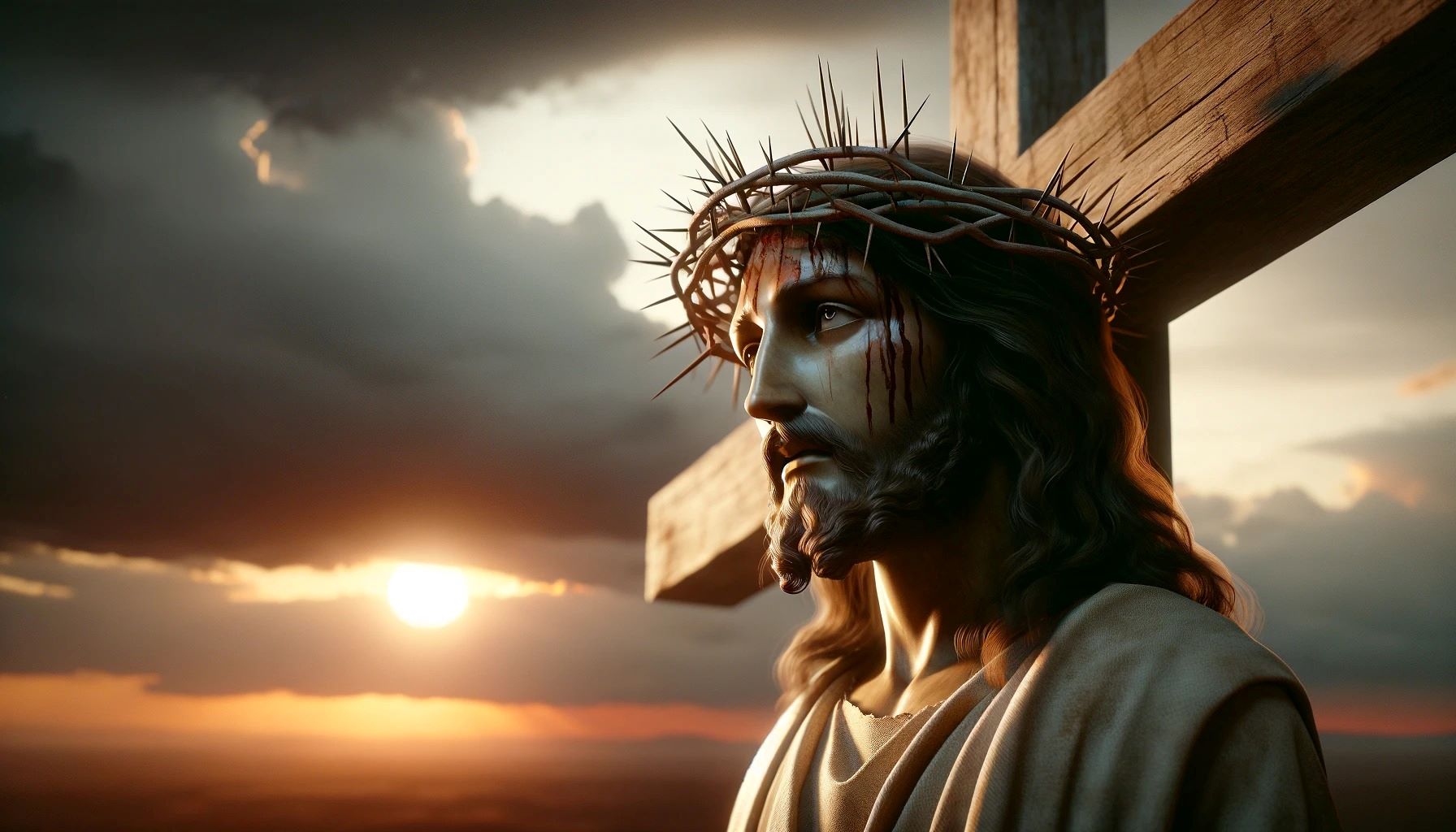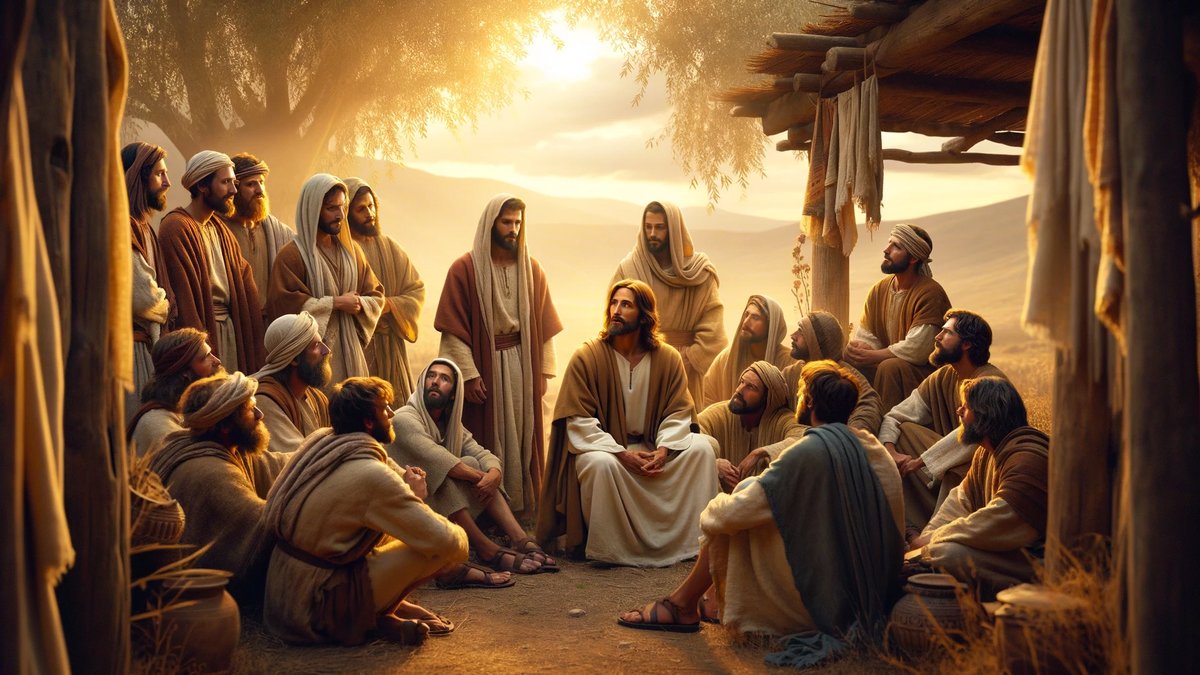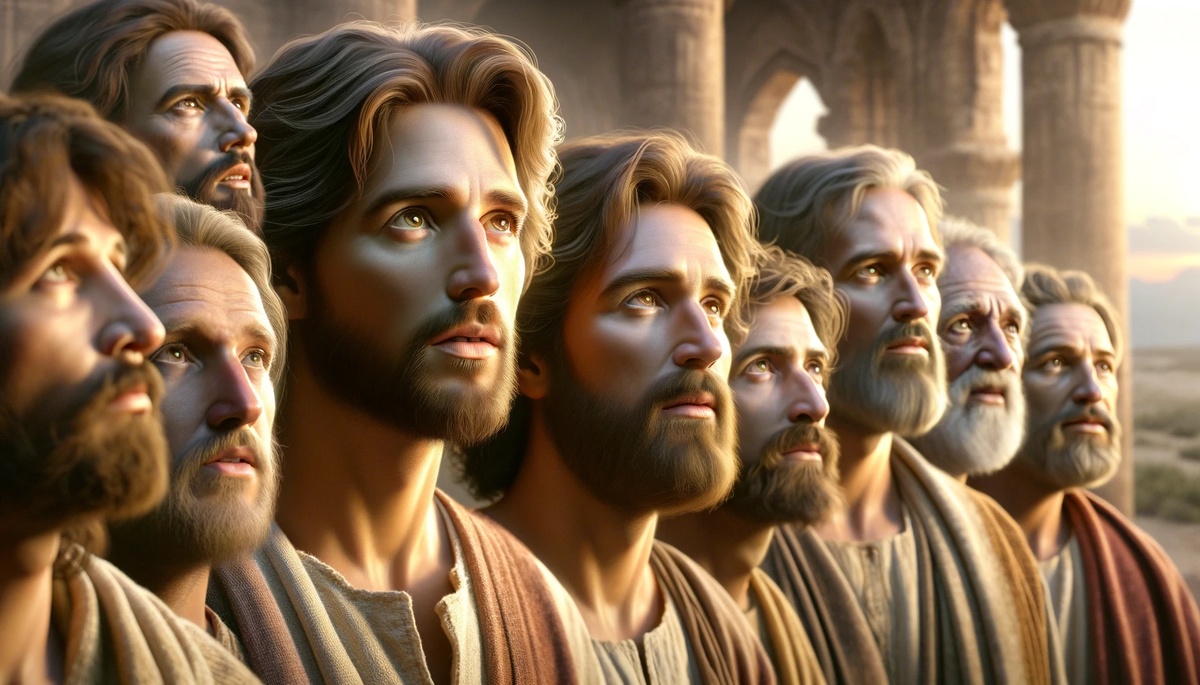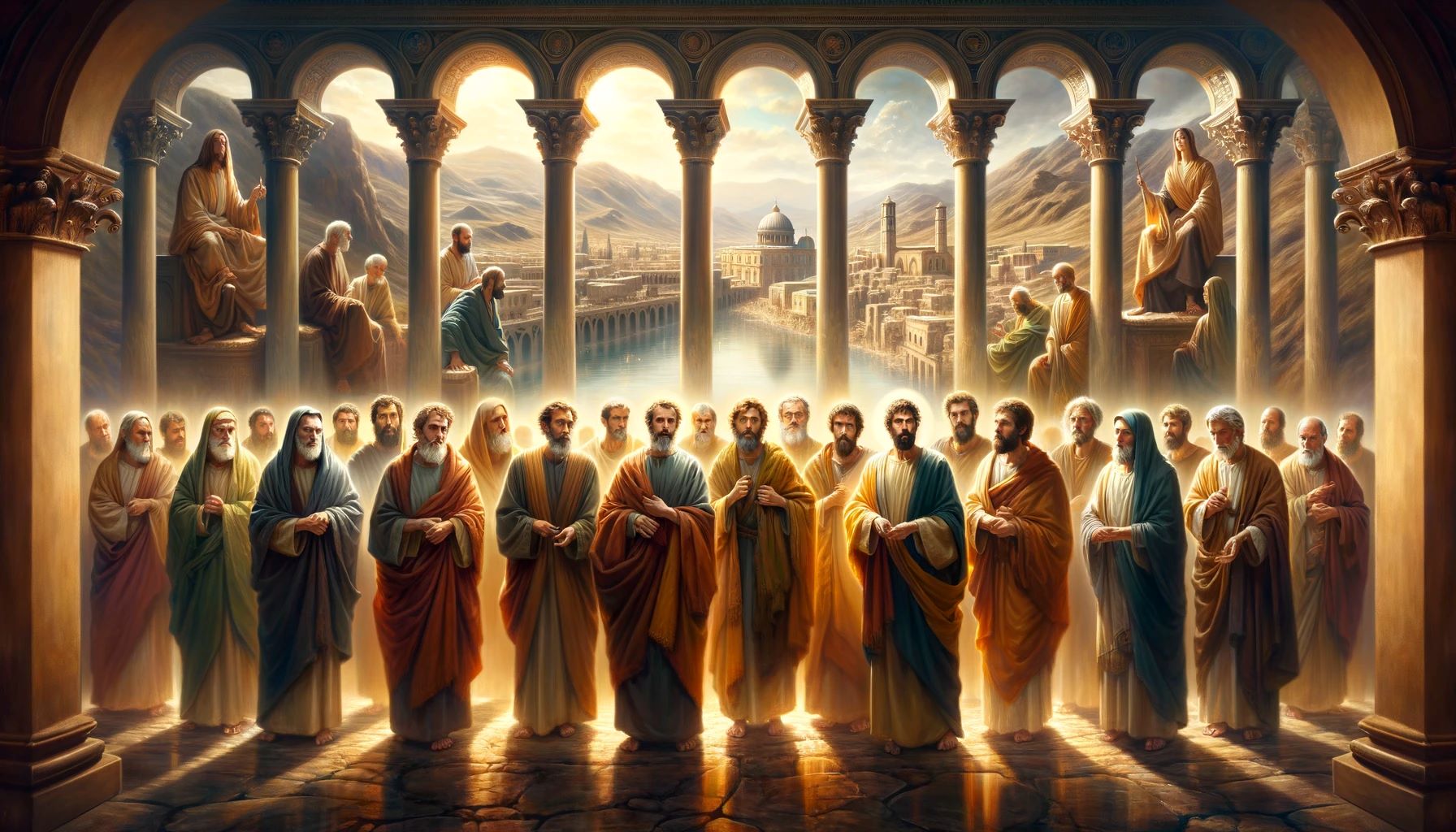Home>Christian Videos>Bible Stories>How Did The 12 Disciples Of Jesus Christ Die
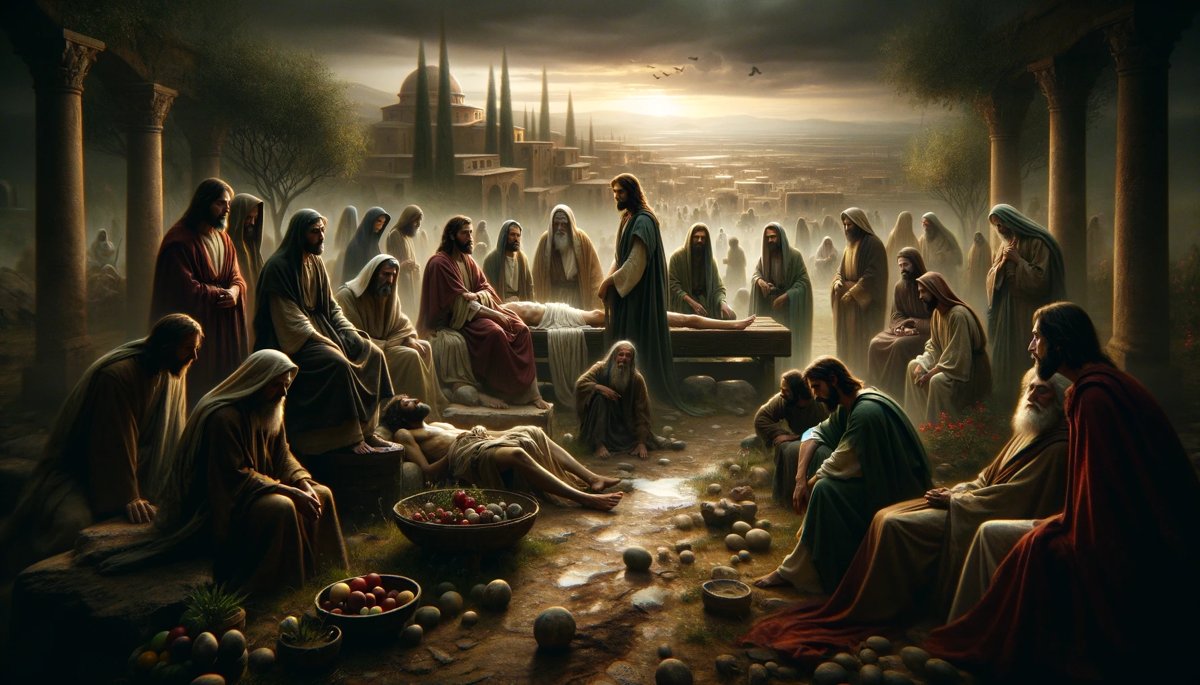

Bible Stories
How Did The 12 Disciples Of Jesus Christ Die
Published: March 1, 2024
Peter Smith, Editorial Director at Christian.net, combines deep insights into faith, politics, and culture to lead content creation that resonates widely. Awarded for his contributions to religious discourse, he previously headed a major organization for religious communicators, enhancing dialogue on faith's societal impacts.
Discover the fate of the 12 disciples of Jesus Christ in this compelling exploration of Bible stories. Uncover the dramatic accounts of their deaths and martyrdom.
(Many of the links in this article redirect to a specific reviewed product. Your purchase of these products through affiliate links helps to generate commission for Christian.net, at no extra cost. Learn more)
Table of Contents
- Introduction
- The Martyrdom of Peter
- The Crucifixion of Andrew
- The Stoning of James the Greater
- The Beheading of James the Lesser
- The Crucifixion of Philip
- The Martyrdom of Bartholomew
- The Crucifixion of Matthew
- The Martyrdom of Thomas
- The Beheading of Simon the Zealot
- The Crucifixion of Thaddeus
- The Martyrdom of Matthias
Introduction
The fate of the 12 disciples of Jesus Christ has been a subject of great interest and significance for Christians around the world. These men, chosen by Jesus to spread his teachings, faced various forms of persecution and martyrdom for their faith. Their stories are a testament to the sacrifices made in the name of Christianity and serve as a source of inspiration for believers. In this article, we will explore the different accounts of how each of the 12 disciples met their end, shedding light on the challenges they endured and the unwavering commitment they had to their beliefs.
Read more: How Did Jesus Christ Die?
The Martyrdom of Peter
-
Crucifixion Upside Down: According to tradition, Peter was crucified in Rome during the reign of Emperor Nero. Feeling unworthy to die in the same manner as Jesus, Peter requested to be crucified upside down, a request that was granted. This act of humility and devotion to his faith has been revered by Christians for centuries.
-
Symbol of Humility: Peter's decision to be crucified upside down has been interpreted as a symbol of humility and unwavering faith. It is seen as a powerful example of his commitment to following in the footsteps of Jesus, even in the face of persecution and death.
-
Legacy of Strength: The martyrdom of Peter has left a lasting legacy in Christian history, serving as a reminder of the sacrifices made by early believers. His unwavering faith and willingness to endure a painful death have inspired countless individuals to stand firm in their own beliefs, even in the most challenging circumstances.
-
Spiritual Significance: For Christians, the martyrdom of Peter holds deep spiritual significance. It is a testament to the strength of faith and the willingness to endure suffering for the sake of one's beliefs. Peter's ultimate sacrifice has been a source of strength and inspiration for believers throughout the ages.
-
Historical Impact: The martyrdom of Peter also holds historical significance, as it is intricately linked to the spread of Christianity. His steadfastness in the face of persecution has been instrumental in shaping the early Christian community and solidifying the foundations of the faith.
-
Continued Reverence: The story of Peter's martyrdom continues to be revered within the Christian tradition, with churches and religious institutions commemorating his sacrifice. His unwavering commitment to his faith serves as a reminder of the enduring power of belief and the willingness to stand firm in the face of adversity.
-
Inspiration for Believers: The martyrdom of Peter stands as a powerful example of faith and resilience, inspiring believers to remain steadfast in their convictions. His willingness to endure a painful death rather than renounce his faith has resonated throughout history, serving as a source of strength for those facing persecution for their beliefs.
-
Eternal Legacy: The legacy of Peter's martyrdom lives on as a testament to the enduring strength of faith. His unwavering commitment to his beliefs, even in the face of death, continues to inspire and uplift those who seek to follow in his footsteps.
-
Symbol of Sacrifice: Peter's martyrdom is a symbol of sacrifice and devotion, reminding believers of the ultimate price paid by early followers of Christ. His story serves as a poignant reminder of the sacrifices made for the sake of spreading the message of Christianity.
-
Enduring Impact: The martyrdom of Peter has left an enduring impact on Christian theology and spirituality, shaping the way believers understand the concept of sacrifice and steadfastness in the face of adversity. His story continues to be a source of strength and inspiration for Christians around the world.
The Crucifixion of Andrew
-
Martyrdom in Patras: Andrew, the brother of Peter, is believed to have met his end through crucifixion in the city of Patras, Greece. According to tradition, he was bound, not nailed, to an X-shaped cross, a symbol that would later become associated with his name. This form of crucifixion was intended to prolong his suffering, yet Andrew remained resolute in his faith until the very end.
-
Symbol of Endurance: The crucifixion of Andrew serves as a powerful symbol of endurance and unwavering faith. Despite facing a painful and prolonged death, Andrew remained steadfast in his commitment to his beliefs, inspiring countless individuals with his resilience and determination.
-
Legacy of Faith: Andrew's martyrdom has left a lasting legacy in Christian history, symbolizing the willingness to endure suffering for the sake of one's faith. His steadfastness in the face of persecution continues to inspire believers to stand firm in their convictions, even in the most challenging circumstances.
-
Spiritual Significance: For Christians, the crucifixion of Andrew holds deep spiritual significance, representing the ultimate sacrifice made in the name of faith. His unwavering commitment to his beliefs, despite the agony he endured, serves as a testament to the enduring strength of faith and the willingness to endure suffering for the sake of one's convictions.
-
Historical Impact: The martyrdom of Andrew holds historical significance, as it is intricately linked to the early spread of Christianity. His unwavering faith and willingness to endure a painful death have been instrumental in shaping the Christian tradition and inspiring future generations of believers.
-
Continued Reverence: The story of Andrew's crucifixion continues to be revered within the Christian tradition, with churches and religious institutions commemorating his sacrifice. His unwavering commitment to his faith serves as a reminder of the enduring power of belief and the willingness to stand firm in the face of adversity.
-
Inspiration for Believers: The crucifixion of Andrew stands as a powerful example of faith and resilience, inspiring believers to remain steadfast in their convictions. His willingness to endure a painful death rather than renounce his faith has resonated throughout history, serving as a source of strength for those facing persecution for their beliefs.
-
Eternal Legacy: The legacy of Andrew's martyrdom lives on as a testament to the enduring strength of faith. His unwavering commitment to his beliefs, even in the face of death, continues to inspire and uplift those who seek to follow in his footsteps.
-
Symbol of Sacrifice: Andrew's crucifixion is a symbol of sacrifice and devotion, reminding believers of the ultimate price paid by early followers of Christ. His story serves as a poignant reminder of the sacrifices made for the sake of spreading the message of Christianity.
-
Enduring Impact: The crucifixion of Andrew has left an enduring impact on Christian theology and spirituality, shaping the way believers understand the concept of sacrifice and steadfastness in the face of adversity. His story continues to be a source of strength and inspiration for Christians around the world.
The Stoning of James the Greater
-
Martyrdom in Jerusalem: James the Greater, one of the first disciples to be called by Jesus, met a tragic end through martyrdom in Jerusalem. According to historical accounts, he was sentenced to death by stoning, a brutal form of execution in which a person is pelted with stones until they succumb to their injuries. James faced this harrowing ordeal with unwavering faith, refusing to renounce his beliefs despite the imminent threat to his life.
-
Symbol of Courage: The stoning of James the Greater stands as a symbol of unparalleled courage and steadfastness in the face of persecution. His refusal to abandon his faith, even in the face of a brutal and agonizing death, serves as an enduring testament to the strength of conviction and the willingness to endure suffering for the sake of one's beliefs.
-
Legacy of Resilience: James' martyrdom has left an indelible mark on Christian history, symbolizing the resilience and unwavering commitment of early believers. His willingness to face persecution and death rather than compromise his faith has inspired countless individuals to stand firm in their own convictions, even in the most dire circumstances.
-
Spiritual Significance: For Christians, the stoning of James the Greater holds profound spiritual significance, representing the ultimate sacrifice made in the name of faith. His steadfastness in the face of brutal persecution serves as a powerful reminder of the enduring strength of belief and the willingness to endure suffering for the sake of one's convictions.
-
Historical Impact: The martyrdom of James the Greater holds significant historical importance, as it is intricately linked to the early spread of Christianity. His unwavering faith and willingness to face a painful death have played a pivotal role in shaping the Christian tradition and inspiring future generations of believers.
-
Continued Reverence: The story of James' stoning continues to be revered within the Christian tradition, with churches and religious institutions commemorating his sacrifice. His unwavering commitment to his faith serves as a poignant reminder of the enduring power of belief and the willingness to stand firm in the face of adversity.
-
Inspiration for Believers: The stoning of James the Greater stands as a powerful example of faith and resilience, inspiring believers to remain steadfast in their convictions. His willingness to endure a painful death rather than renounce his faith has resonated throughout history, serving as a source of strength for those facing persecution for their beliefs.
-
Eternal Legacy: The legacy of James' martyrdom lives on as a testament to the enduring strength of faith. His unwavering commitment to his beliefs, even in the face of death, continues to inspire and uplift those who seek to follow in his footsteps.
-
Symbol of Sacrifice: James' stoning is a profound symbol of sacrifice and devotion, reminding believers of the ultimate price paid by early followers of Christ. His story serves as a poignant reminder of the sacrifices made for the sake of spreading the message of Christianity.
-
Enduring Impact: The stoning of James the Greater has left an enduring impact on Christian theology and spirituality, shaping the way believers understand the concept of sacrifice and steadfastness in the face of adversity. His story continues to be a source of strength and inspiration for Christians around the world.
The Beheading of James the Lesser
-
Martyrdom in Jerusalem: James the Lesser, also known as James the Just, faced martyrdom in Jerusalem, where he was subjected to a brutal form of execution – beheading. This tragic end to his life was a result of his unwavering commitment to his faith and his refusal to renounce his beliefs, even in the face of imminent death.
-
Symbol of Devotion: The beheading of James the Lesser stands as a powerful symbol of devotion and steadfastness in the face of persecution. His willingness to face a gruesome death rather than compromise his faith serves as an enduring testament to the strength of conviction and the unwavering commitment to his beliefs.
-
Legacy of Sacrifice: James' martyrdom has left a profound impact on Christian history, symbolizing the sacrifices made by early believers. His unwavering faith and willingness to endure a brutal form of execution have inspired countless individuals to stand firm in their own convictions, even in the most dire circumstances.
-
Spiritual Significance: For Christians, the beheading of James the Lesser holds deep spiritual significance, representing the ultimate sacrifice made in the name of faith. His steadfastness in the face of brutal persecution serves as a powerful reminder of the enduring strength of belief and the willingness to endure suffering for the sake of one's convictions.
-
Historical Impact: The martyrdom of James the Lesser holds significant historical importance, as it is intricately linked to the early spread of Christianity. His unwavering faith and willingness to face a painful death have played a pivotal role in shaping the Christian tradition and inspiring future generations of believers.
-
Continued Reverence: The story of James' beheading continues to be revered within the Christian tradition, with churches and religious institutions commemorating his sacrifice. His unwavering commitment to his faith serves as a poignant reminder of the enduring power of belief and the willingness to stand firm in the face of adversity.
-
Inspiration for Believers: The beheading of James the Lesser stands as a powerful example of faith and resilience, inspiring believers to remain steadfast in their convictions. His willingness to endure a painful death rather than renounce his faith has resonated throughout history, serving as a source of strength for those facing persecution for their beliefs.
-
Eternal Legacy: The legacy of James' martyrdom lives on as a testament to the enduring strength of faith. His unwavering commitment to his beliefs, even in the face of death, continues to inspire and uplift those who seek to follow in his footsteps.
-
Symbol of Sacrifice: James' beheading is a profound symbol of sacrifice and devotion, reminding believers of the ultimate price paid by early followers of Christ. His story serves as a poignant reminder of the sacrifices made for the sake of spreading the message of Christianity.
-
Enduring Impact: The beheading of James the Lesser has left an enduring impact on Christian theology and spirituality, shaping the way believers understand the concept of sacrifice and steadfastness in the face of adversity. His story continues to be a source of strength and inspiration for Christians around the world.
Read more: Where Did Jesus Christ Die
The Crucifixion of Philip
-
Martyrdom in Hierapolis: Philip, one of the 12 disciples of Jesus, faced martyrdom through crucifixion in the ancient city of Hierapolis. This form of execution involved being affixed to a cross, a fate that Philip embraced with unwavering faith and courage.
-
Symbol of Faith: The crucifixion of Philip stands as a profound symbol of faith and devotion. Despite the agonizing nature of crucifixion, Philip remained resolute in his commitment to his beliefs, serving as an enduring testament to the strength of conviction and the willingness to endure suffering for the sake of one's faith.
-
Legacy of Sacrifice: Philip's martyrdom has left an indelible mark on Christian history, symbolizing the sacrifices made by early believers. His unwavering faith and willingness to endure a painful death have inspired countless individuals to stand firm in their own convictions, even in the most dire circumstances.
-
Spiritual Significance: For Christians, the crucifixion of Philip holds deep spiritual significance, representing the ultimate sacrifice made in the name of faith. His steadfastness in the face of brutal persecution serves as a powerful reminder of the enduring strength of belief and the willingness to endure suffering for the sake of one's convictions.
-
Historical Impact: The martyrdom of Philip holds significant historical importance, as it is intricately linked to the early spread of Christianity. His unwavering faith and willingness to face a painful death have played a pivotal role in shaping the Christian tradition and inspiring future generations of believers.
-
Continued Reverence: The story of Philip's crucifixion continues to be revered within the Christian tradition, with churches and religious institutions commemorating his sacrifice. His unwavering commitment to his faith serves as a poignant reminder of the enduring power of belief and the willingness to stand firm in the face of adversity.
-
Inspiration for Believers: The crucifixion of Philip stands as a powerful example of faith and resilience, inspiring believers to remain steadfast in their convictions. His willingness to endure a painful death rather than renounce his faith has resonated throughout history, serving as a source of strength for those facing persecution for their beliefs.
-
Eternal Legacy: The legacy of Philip's martyrdom lives on as a testament to the enduring strength of faith. His unwavering commitment to his beliefs, even in the face of death, continues to inspire and uplift those who seek to follow in his footsteps.
-
Symbol of Sacrifice: Philip's crucifixion is a profound symbol of sacrifice and devotion, reminding believers of the ultimate price paid by early followers of Christ. His story serves as a poignant reminder of the sacrifices made for the sake of spreading the message of Christianity.
-
Enduring Impact: The crucifixion of Philip has left an enduring impact on Christian theology and spirituality, shaping the way believers understand the concept of sacrifice and steadfastness in the face of adversity. His story continues to be a source of strength and inspiration for Christians around the world.
The Martyrdom of Bartholomew
-
Martyrdom in Armenia: Bartholomew, also known as Nathanael, is believed to have faced martyrdom in Armenia. According to historical accounts, he was subjected to a gruesome fate, enduring various forms of torture before ultimately being put to death. This harrowing ordeal serves as a testament to his unwavering commitment to his faith and his refusal to renounce his beliefs, even in the face of extreme suffering.
-
Symbol of Endurance: The martyrdom of Bartholomew stands as a powerful symbol of endurance and steadfastness in the face of persecution. Despite facing unimaginable torment, Bartholomew remained resolute in his commitment to his beliefs, inspiring countless individuals with his resilience and determination.
-
Legacy of Courage: Bartholomew's martyrdom has left a lasting legacy in Christian history, symbolizing the courage and unwavering commitment of early believers. His willingness to endure unspeakable suffering for the sake of his faith has inspired generations of Christians to stand firm in their own convictions, even in the most dire circumstances.
-
Spiritual Significance: For Christians, the martyrdom of Bartholomew holds deep spiritual significance, representing the ultimate sacrifice made in the name of faith. His steadfastness in the face of brutal persecution serves as a powerful reminder of the enduring strength of belief and the willingness to endure suffering for the sake of one's convictions.
-
Historical Impact: The martyrdom of Bartholomew holds significant historical importance, as it is intricately linked to the early spread of Christianity. His unwavering faith and willingness to face excruciating torment have played a pivotal role in shaping the Christian tradition and inspiring future generations of believers.
-
Continued Reverence: The story of Bartholomew's martyrdom continues to be revered within the Christian tradition, with churches and religious institutions commemorating his sacrifice. His unwavering commitment to his faith serves as a poignant reminder of the enduring power of belief and the willingness to stand firm in the face of adversity.
-
Inspiration for Believers: The martyrdom of Bartholomew stands as a powerful example of faith and resilience, inspiring believers to remain steadfast in their convictions. His willingness to endure unspeakable suffering rather than renounce his faith has resonated throughout history, serving as a source of strength for those facing persecution for their beliefs.
-
Eternal Legacy: The legacy of Bartholomew's martyrdom lives on as a testament to the enduring strength of faith. His unwavering commitment to his beliefs, even in the face of death, continues to inspire and uplift those who seek to follow in his footsteps.
-
Symbol of Sacrifice: Bartholomew's martyrdom is a profound symbol of sacrifice and devotion, reminding believers of the ultimate price paid by early followers of Christ. His story serves as a poignant reminder of the sacrifices made for the sake of spreading the message of Christianity.
-
Enduring Impact: The martyrdom of Bartholomew has left an enduring impact on Christian theology and spirituality, shaping the way believers understand the concept of sacrifice and steadfastness in the face of adversity. His story continues to be a source of strength and inspiration for Christians around the world.
The Crucifixion of Matthew
-
Martyrdom in Ethiopia: Matthew, also known as Levi, faced martyrdom through crucifixion in the ancient city of Nadabah in Ethiopia. This form of execution involved being affixed to a cross, a fate that Matthew embraced with unwavering faith and courage.
-
Symbol of Faith: The crucifixion of Matthew stands as a profound symbol of faith and devotion. Despite the agonizing nature of crucifixion, Matthew remained resolute in his commitment to his beliefs, serving as an enduring testament to the strength of conviction and the willingness to endure suffering for the sake of one's faith.
-
Legacy of Sacrifice: Matthew's martyrdom has left an indelible mark on Christian history, symbolizing the sacrifices made by early believers. His unwavering faith and willingness to endure a painful death have inspired countless individuals to stand firm in their own convictions, even in the most dire circumstances.
-
Spiritual Significance: For Christians, the crucifixion of Matthew holds deep spiritual significance, representing the ultimate sacrifice made in the name of faith. His steadfastness in the face of brutal persecution serves as a powerful reminder of the enduring strength of belief and the willingness to endure suffering for the sake of one's convictions.
-
Historical Impact: The martyrdom of Matthew holds significant historical importance, as it is intricately linked to the early spread of Christianity. His unwavering faith and willingness to face a painful death have played a pivotal role in shaping the Christian tradition and inspiring future generations of believers.
-
Continued Reverence: The story of Matthew's crucifixion continues to be revered within the Christian tradition, with churches and religious institutions commemorating his sacrifice. His unwavering commitment to his faith serves as a poignant reminder of the enduring power of belief and the willingness to stand firm in the face of adversity.
-
Inspiration for Believers: The crucifixion of Matthew stands as a powerful example of faith and resilience, inspiring believers to remain steadfast in their convictions. His willingness to endure a painful death rather than renounce his faith has resonated throughout history, serving as a source of strength for those facing persecution for their beliefs.
-
Eternal Legacy: The legacy of Matthew's martyrdom lives on as a testament to the enduring strength of faith. His unwavering commitment to his beliefs, even in the face of death, continues to inspire and uplift those who seek to follow in his footsteps.
-
Symbol of Sacrifice: Matthew's crucifixion is a profound symbol of sacrifice and devotion, reminding believers of the ultimate price paid by early followers of Christ. His story serves as a poignant reminder of the sacrifices made for the sake of spreading the message of Christianity.
-
Enduring Impact: The crucifixion of Matthew has left an enduring impact on Christian theology and spirituality, shaping the way believers understand the concept of sacrifice and steadfastness in the face of adversity. His story continues to be a source of strength and inspiration for Christians around the world.
The Martyrdom of Thomas
-
Martyrdom in India: Thomas, also known as Didymus, faced martyrdom in India, where he was put to death for his unwavering commitment to his faith. According to historical accounts, Thomas was speared to death, enduring a painful and brutal end as a result of his refusal to renounce his beliefs.
-
Symbol of Devotion: The martyrdom of Thomas stands as a powerful symbol of devotion and steadfastness in the face of persecution. His willingness to face a gruesome death rather than compromise his faith serves as an enduring testament to the strength of conviction and the unwavering commitment to his beliefs.
-
Legacy of Sacrifice: Thomas's martyrdom has left an indelible mark on Christian history, symbolizing the sacrifices made by early believers. His unwavering faith and willingness to endure a painful death have inspired countless individuals to stand firm in their own convictions, even in the most dire circumstances.
-
Spiritual Significance: For Christians, the martyrdom of Thomas holds deep spiritual significance, representing the ultimate sacrifice made in the name of faith. His steadfastness in the face of brutal persecution serves as a powerful reminder of the enduring strength of belief and the willingness to endure suffering for the sake of one's convictions.
-
Historical Impact: The martyrdom of Thomas holds significant historical importance, as it is intricately linked to the early spread of Christianity. His unwavering faith and willingness to face a painful death have played a pivotal role in shaping the Christian tradition and inspiring future generations of believers.
-
Continued Reverence: The story of Thomas's martyrdom continues to be revered within the Christian tradition, with churches and religious institutions commemorating his sacrifice. His unwavering commitment to his faith serves as a poignant reminder of the enduring power of belief and the willingness to stand firm in the face of adversity.
-
Inspiration for Believers: The martyrdom of Thomas stands as a powerful example of faith and resilience, inspiring believers to remain steadfast in their convictions. His willingness to endure a painful death rather than renounce his faith has resonated throughout history, serving as a source of strength for those facing persecution for their beliefs.
-
Eternal Legacy: The legacy of Thomas's martyrdom lives on as a testament to the enduring strength of faith. His unwavering commitment to his beliefs, even in the face of death, continues to inspire and uplift those who seek to follow in his footsteps.
-
Symbol of Sacrifice: Thomas's martyrdom is a profound symbol of sacrifice and devotion, reminding believers of the ultimate price paid by early followers of Christ. His story serves as a poignant reminder of the sacrifices made for the sake of spreading the message of Christianity.
-
Enduring Impact: The martyrdom of Thomas has left an enduring impact on Christian theology and spirituality, shaping the way believers understand the concept of sacrifice and steadfastness in the face of adversity. His story continues to be a source of strength and inspiration for Christians around the world.
Read more: Why Did Jesus Christ Die
The Beheading of Simon the Zealot
-
Martyrdom in Persia: Simon the Zealot, also known as Simon the Cananaean, met his tragic end through martyrdom in Persia. According to historical accounts, he was condemned to be beheaded, a fate he faced with unwavering faith and courage.
-
Symbol of Steadfastness: The beheading of Simon the Zealot stands as a powerful symbol of steadfastness and devotion in the face of persecution. Despite the imminent threat to his life, Simon remained resolute in his commitment to his beliefs, serving as an enduring testament to the strength of conviction and the willingness to endure suffering for the sake of one's faith.
-
Legacy of Sacrifice: Simon's martyrdom has left a profound impact on Christian history, symbolizing the sacrifices made by early believers. His unwavering faith and willingness to face a brutal form of execution have inspired countless individuals to stand firm in their own convictions, even in the most dire circumstances.
-
Spiritual Significance: For Christians, the beheading of Simon the Zealot holds deep spiritual significance, representing the ultimate sacrifice made in the name of faith. His steadfastness in the face of brutal persecution serves as a powerful reminder of the enduring strength of belief and the willingness to endure suffering for the sake of one's convictions.
-
Historical Impact: The martyrdom of Simon the Zealot holds significant historical importance, as it is intricately linked to the early spread of Christianity. His unwavering faith and willingness to face a painful death have played a pivotal role in shaping the Christian tradition and inspiring future generations of believers.
-
Continued Reverence: The story of Simon's beheading continues to be revered within the Christian tradition, with churches and religious institutions commemorating his sacrifice. His unwavering commitment to his faith serves as a poignant reminder of the enduring power of belief and the willingness to stand firm in the face of adversity.
-
Inspiration for Believers: The beheading of Simon the Zealot stands as a powerful example of faith and resilience, inspiring believers to remain steadfast in their convictions. His willingness to endure a painful death rather than renounce his faith has resonated throughout history, serving as a source of strength for those facing persecution for their beliefs.
-
Eternal Legacy: The legacy of Simon's martyrdom lives on as a testament to the enduring strength of faith. His unwavering commitment to his beliefs, even in the face of death, continues to inspire and uplift those who seek to follow in his footsteps.
-
Symbol of Sacrifice: Simon's beheading is a profound symbol of sacrifice and devotion, reminding believers of the ultimate price paid by early followers of Christ. His story serves as a poignant reminder of the sacrifices made for the sake of spreading the message of Christianity.
-
Enduring Impact: The beheading of Simon the Zealot has left an enduring impact on Christian theology and spirituality, shaping the way believers understand the concept of sacrifice and steadfastness in the face of adversity. His story continues to be a source of strength and inspiration for Christians around the world.
The Crucifixion of Thaddeus
-
Martyrdom in Edessa: Thaddeus, also known as Jude or Lebbaeus, faced martyrdom through crucifixion in the city of Edessa. According to historical accounts, Thaddeus was bound to a cross and left to endure a painful and agonizing death for his unwavering commitment to his faith.
-
Symbol of Endurance: The crucifixion of Thaddeus stands as a profound symbol of endurance and steadfastness in the face of persecution. Despite the excruciating nature of crucifixion, Thaddeus remained resolute in his commitment to his beliefs, serving as an enduring testament to the strength of conviction and the willingness to endure suffering for the sake of one's faith.
-
Legacy of Sacrifice: Thaddeus's martyrdom has left an indelible mark on Christian history, symbolizing the sacrifices made by early believers. His unwavering faith and willingness to endure a painful death have inspired countless individuals to stand firm in their own convictions, even in the most dire circumstances.
-
Spiritual Significance: For Christians, the crucifixion of Thaddeus holds deep spiritual significance, representing the ultimate sacrifice made in the name of faith. His steadfastness in the face of brutal persecution serves as a powerful reminder of the enduring strength of belief and the willingness to endure suffering for the sake of one's convictions.
-
Historical Impact: The martyrdom of Thaddeus holds significant historical importance, as it is intricately linked to the early spread of Christianity. His unwavering faith and willingness to face a painful death have played a pivotal role in shaping the Christian tradition and inspiring future generations of believers.
-
Continued Reverence: The story of Thaddeus's crucifixion continues to be revered within the Christian tradition, with churches and religious institutions commemorating his sacrifice. His unwavering commitment to his faith serves as a poignant reminder of the enduring power of belief and the willingness to stand firm in the face of adversity.
-
Inspiration for Believers: The crucifixion of Thaddeus stands as a powerful example of faith and resilience, inspiring believers to remain steadfast in their convictions. His willingness to endure a painful death rather than renounce his faith has resonated throughout history, serving as a source of strength for those facing persecution for their beliefs.
-
Eternal Legacy: The legacy of Thaddeus's martyrdom lives on as a testament to the enduring strength of faith. His unwavering commitment to his beliefs, even in the face of death, continues to inspire and uplift those who seek to follow in his footsteps.
-
Symbol of Sacrifice: Thaddeus's crucifixion is a profound symbol of sacrifice and devotion, reminding believers of the ultimate price paid by early followers of Christ. His story serves as a poignant reminder of the sacrifices made for the sake of spreading the message of Christianity.
-
Enduring Impact: The crucifixion of Thaddeus has left an enduring impact on Christian theology and spirituality, shaping the way believers understand the concept of sacrifice and steadfastness in the face of adversity. His story continues to be a source of strength and inspiration for Christians around the world.
The Martyrdom of Matthias
-
Martyrdom in Judea: Matthias, also known as the apostle chosen to replace Judas Iscariot, faced martyrdom in Judea. According to historical accounts, Matthias was stoned to death, a brutal form of execution in which a person is pelted with stones until they succumb to their injuries. This tragic end to his life was a result of his unwavering commitment to his faith and his refusal to renounce his beliefs, even in the face of imminent death.
-
Symbol of Faith: The martyrdom of Matthias stands as a powerful symbol of faith and devotion. His willingness to face a brutal death rather than compromise his faith serves as an enduring testament to the strength of conviction and the unwavering commitment to his beliefs.
-
Legacy of Sacrifice: Matthias's martyrdom has left a profound impact on Christian history, symbolizing the sacrifices made by early believers. His unwavering faith and willingness to endure a painful death have inspired countless individuals to stand firm in their own convictions, even in the most dire circumstances.
-
Spiritual Significance: For Christians, the martyrdom of Matthias holds deep spiritual significance, representing the ultimate sacrifice made in the name of faith. His steadfastness in the face of brutal persecution serves as a powerful reminder of the enduring strength of belief and the willingness to endure suffering for the sake of one's convictions.
-
Historical Impact: The martyrdom of Matthias holds significant historical importance, as it is intricately linked to the early spread of Christianity. His unwavering faith and willingness to face a painful death have played a pivotal role in shaping the Christian tradition and inspiring future generations of believers.
-
Continued Reverence: The story of Matthias's martyrdom continues to be revered within the Christian tradition, with churches and religious institutions commemorating his sacrifice. His unwavering commitment to his faith serves as a poignant reminder of the enduring power of belief and the willingness to stand firm in the face of adversity.
-
Inspiration for Believers: The martyrdom of Matthias stands as a powerful example of faith and resilience, inspiring believers to remain steadfast in their convictions. His willingness to endure a painful death rather than renounce his faith has resonated throughout history, serving as a source of strength for those facing persecution for their beliefs.
-
Eternal Legacy: The legacy of Matthias's martyrdom lives on as a testament to the enduring strength of faith. His unwavering commitment to his beliefs, even in the face of death, continues to inspire and uplift those who seek to follow in his footsteps.
-
Symbol of Sacrifice: Matthias's martyrdom is a profound symbol of sacrifice and devotion, reminding believers of the ultimate price paid by early followers of Christ. His story serves as a poignant reminder of the sacrifices made for the sake of spreading the message of Christianity.
-
Enduring Impact: The martyrdom of Matthias has left an enduring impact on Christian theology and spirituality, shaping the way believers understand the concept of sacrifice and steadfastness in the face of adversity. His story continues to be a source of strength and inspiration for Christians around the world.
